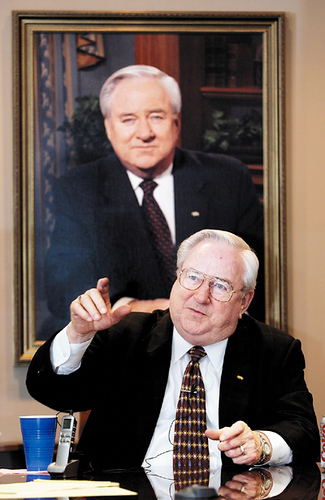Andrew Sullivan:

...In Britain, where the cause of marriage equality is being championed by a Conservative prime minister (rendering him, by US standards, a socialist Satanist), a new poll finds a plurality of 45 - 36 - in favor of turning same-sex civil partnerships into civil marriages. Another new poll finds very similar results: 43 - 32. Among those under 24, the support for full marriage equality is 66 percent. Among those over 60, it is 21 percent - an even more extreme generation gap than in the US. But for even the over-60s, 71 percent favor either civil marriage or civil partnerships with all the legal rights of civil marriage. Britain is light years' ahead of the US now on this issue - because conservatism there is not in the grip of religious fundamentalism.
But it's particularly gratifying to see in Britain how the Conservatives are actually leading the way in reforming this institution to include every Brit, gay or straight. That's in the tradition of Burke and Disraeli, who both believed that institutions needed to be reformed in order to remain the same in a constantly changing society. Cameron used this issue - full inclusion of and equality for gays - and an aggressive response to climate change as the key indicators that he was a modern conservative, not a religious reactionary. In the US, these two issues have now become fundamentalist litmus tests. To be a conservative in America means implacable hostility to any recognition of gay relationships and denial of the existence of climate change. Both positions are driven by religious fundamentalism.

So look at another conservative path - the kind of path that could not exist if Corey Robin is correct about conservatism's essence. And yet, at his last very Conservative Party Conference speech, Cameron forthrightly declared:


...In Britain, where the cause of marriage equality is being championed by a Conservative prime minister (rendering him, by US standards, a socialist Satanist), a new poll finds a plurality of 45 - 36 - in favor of turning same-sex civil partnerships into civil marriages. Another new poll finds very similar results: 43 - 32. Among those under 24, the support for full marriage equality is 66 percent. Among those over 60, it is 21 percent - an even more extreme generation gap than in the US. But for even the over-60s, 71 percent favor either civil marriage or civil partnerships with all the legal rights of civil marriage. Britain is light years' ahead of the US now on this issue - because conservatism there is not in the grip of religious fundamentalism.
But it's particularly gratifying to see in Britain how the Conservatives are actually leading the way in reforming this institution to include every Brit, gay or straight. That's in the tradition of Burke and Disraeli, who both believed that institutions needed to be reformed in order to remain the same in a constantly changing society. Cameron used this issue - full inclusion of and equality for gays - and an aggressive response to climate change as the key indicators that he was a modern conservative, not a religious reactionary. In the US, these two issues have now become fundamentalist litmus tests. To be a conservative in America means implacable hostility to any recognition of gay relationships and denial of the existence of climate change. Both positions are driven by religious fundamentalism.

So look at another conservative path - the kind of path that could not exist if Corey Robin is correct about conservatism's essence. And yet, at his last very Conservative Party Conference speech, Cameron forthrightly declared:
"I don't support gay marriage in spite of being a conservative, I support gay marriage because I am a conservative."Today, the British media has been full of Tory voices backing marriage equality as a socially conservative policy, as, of course, it is. Over to Matthew D'Ancona, one of the leading conservative intellectuals and writers in Britain:
[T]he case for gay marriage is essentially conservative. I am grateful to Ian Ker’s magisterial new biography of G K Chesterton for the following observation by its subject: “All conservatism goes upon the assumption that if you leave a thing alone, you’ll leave a thing as it is. But you do not. If you leave a thing to itself, you are leaving it to wild and violent changes.” The example cited by GKC was the Vale of the White Horse in Berkshire, symbol of ancient England, and constantly in need of repainting.The poll also shows high numbers saying that this need not be a legislative priority right now. Understandable, given an economy in a depression now longer than the Great Depression. But it hardly distracts from economic management for a free vote to take place in the House of Commons. And it gives me enormous pride to see one party in the Anglo-American conservative world being genuinely conservative rather than reactionary.
Chesterton was scarcely a moderniser. But his point applies well to the institution of marriage. In an age of impatience, lives based on tactics not strategy, and instant gratification, matrimony is in dire need of renewal and restoration. Last week, Cardinal O’Brien argued that procreation was the essence of marriage. I beg to differ, and to suggest that the ideal at the core of this dilapidated institution is lifelong commitment and, crucially, a public vow by two people to forge such a shared life.
If marriage is indeed the cornerstone of a stable society, as conservatives plausibly argue, then its extension to same-sex couples will be a stabilising force. Gay couples who marry will not only be exercising a new right; they will be recruited to, and reinforcing, an ancient institution.

No comments:
Post a Comment